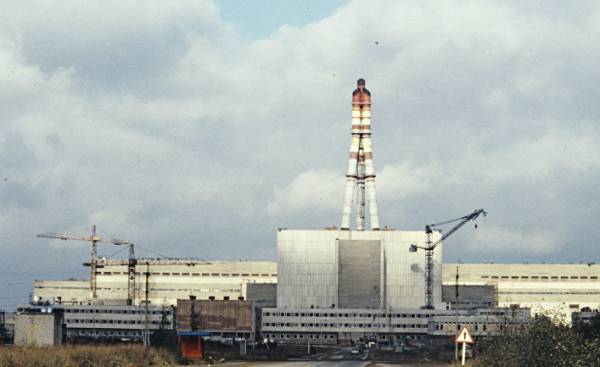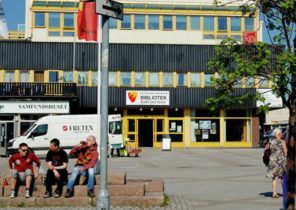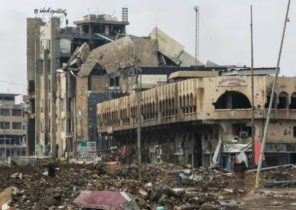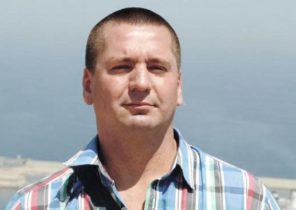
Delfi continues to publish the materials of the project “Postbelica”. This time we will talk about the death of the city. We drove for a few days. Outside the window, flashed a tiny village and a small cozy town — all mixed into one slightly blurred impression of a European country experiencing a new phase of life. But I was warned that in Lithuania there is a place, which, if not surprised, it just adds contrast to this blurry image. It was about Visaginas.
I was introduced to this city as the most English speaking, and actually slightly Pro-Russian: the ribbons, the t-shirt “Polite people” and the list goes on. And this situation I was not pleased. Every day, we somehow met on the road the fragments of the Russian discourse, they specially like someone laid in the most painful points of the Lithuanian society. I was afraid that this story will be all the same as in the previous talk about Russia, about politics and the external threat. But there I was expecting something completely different.
Visaginas is a typical monogoroda with all its advantages and disadvantages. It was specially built for the comfortable life of those who served the Ignalina nuclear power plant. It was a global construction, there gathered the specialists from all over the USSR who were talking among themselves mostly in Russian. NPP was an incredibly ambitious project of impressive scale, ten years later it reached the peak shape and produces 88 percent of the Lithuanian energy. The city grew rich, attracting the best staff and flourished.
In this beautiful story there is only one but: almost all of the Soviet atomic colossi and company towns have always been susceptible to the same disease — they are completely dependent on the enterprise, around which is built. No businesses, no city. It happened with Visaginas. Ignalina NPP, in fact, became one of the most serious casualties that had to bring Lithuania to integrate into the European Union.
After reading about how his life ended Ignalina NPP, I was prepared for the meeting with this urban depression. What else to expect from a city that has lost its main source of vitality? When we first met Visaginas seemed really broken. It is something of an average Russian city, barely survived the early accumulation of initial capital. Unfinished buildings apathetically look at the world with empty black eye sockets, walls scribbled incompetent hands is not the most prominent artists in concrete slums can meet real, absolutely authentic pals with their irresistible intonations and mannerisms. The impression was compounded by the figures on the outflow of population, unemployment, etc.
The only thing Visaginas fall in love with at first sight — this amazing nature: forest, lake, clean air and silence, is not peculiar to the city. Sitting on the Bank of fishermen and in Russian in the light of abuse of power, and is not clear about what kind of government speech, and whom they mean when they say “we” — the Russians or the Lithuanians. However, such talk is universal, and it does not matter what the national context. The wind immediately blows the grumpy mumble to the other shore of the lake, on which stands a small boat station. On the wall painted a huge butterfly. Unknown, it’s a coincidence or not, but if you look at Visaginas from the height of bird flight, it is easy to guess the contours of a butterfly. However one of her wings never managed to finish. In all this there is something apocalyptic, a strange premonition of the destruction of civilization, when man goes, nature takes. But this is just a glimpse of the pessimist.
Having been in Visaginas, listening to conversations and reading articles about what this city has outlived its usefulness, I wondered, is it so bad? Overall, the city is about the convenience of the organization of social life. Perhaps he, too, has a shelf life, especially when we are talking about mono, which is vulnerable more than others. If this form of organizing people is not justified, you may want to reconsider? However, with this logic, not everyone agrees. In the recent elections to the city Council of Visaginas was talking about the future, how would you save the city from destruction.
Eugene Shuklin — the one who was elected to the city Council. This is a new phase of his career, which was as yet little known. Much more recognizable Shuklin at his previous achievements: it is a famous canoeist, multiple world and European champion, Olympic medalist. Recently he decided to end his athletic career and to engage in social activities. He does not mention this policy and believes that just participating in the life of the city. Shuklin is one of desperate optimists of Visaginas. After his retirement he settled in Vilnius or London. He had many offers, but he just returned to his home. It is here that he started his sports career, he decided to try to place in something else.
“Visaginas is like a big family, there’s an incredible level of support. The whole city welcomes you after the competition, we always feel the support. For me it was always important, and I would like to repay that debt to people, to do something useful. I’ve traveled and lived. Everywhere its advantages, but in Visaginas. Here I feel at home, relax,” says Shuklin.
Now he, along with his team is actively working on a plan to save the city. He admits that before the elections, everything seemed easier, but when he saw the mechanism of public administration from the inside, we realized that quickly and easily will not.
“The power plant provided 88 percent of all energy in the country, our parents built it 20 years of trouble-free operated, and after closing all the problems we have inherited. The city was built with the expectation that there will be a nuclear plant. The boiler that serves the Visaginas was built with the expectation to provide the station with warmth. Therefore, there is a large cross section of the pipe, and after the close heat loss affect the rates. Fire, hospital, everything was built taking into account possible emergency, and we have to contain objects, which often exceed the requirements of the city of 20 thousand inhabitants. There are many such examples. Even the wide street from us specifically in order to be able to quickly evacuate,” the Shuklin lists urban problems, says the lack of funds for the closure of nuclear power stations.
He says that the remaining specialists reduce wages, and that naturally will cause a new outflow of personnel. So far, the plan to stop nuclear power plants suggests that it will remain nothing, open field. Shuklin argues that this is not the best scenario: the resources were inherited from the Soviet past, can be used more efficiently, not just throw.
“The world’s growing need for information storage in the “cloud”. Many companies are working on this, to build modern server, the EU has outlined a strategy for the construction of 7 data centers. What you need to build a data center? Large room, no seismic activity, protected area, water cooling, because a lot of heat is released, the grid approach. This is all we are going to dismantle and spend millions. We have intakes, which tomorrow you can run and cool the entire server room, we have a network approach of electricity, designed for a nuclear power plant. We’ve got the facilities, clean blocks that you can use tomorrow. And we are going to dismantle. Climate, on the ecosystem we are perfect. We propose to revise the strategy, save the fact that it is possible to use. With our resources and infrastructure, we could become the largest data center in the world. The larger the data center, the cheaper the unit of information is — it will be in demand. In America for buy now closed nuclear plant and based on them make data centers in other countries also working in this direction,” says Shuklin.
My question about the town as a sportsman who, too, once should finish his career Shuklin cleverly retorted: he says that this is a narrow view, and the city is more of a sport. He believes that though ceased to participate in the competition, but can pass on their experience to others, his sparring partner — to become a top athlete and beat the world record, and therefore validated, his case continues. And if the Visaginas lived through nuclear energy, now it is possible to come up with something else.







